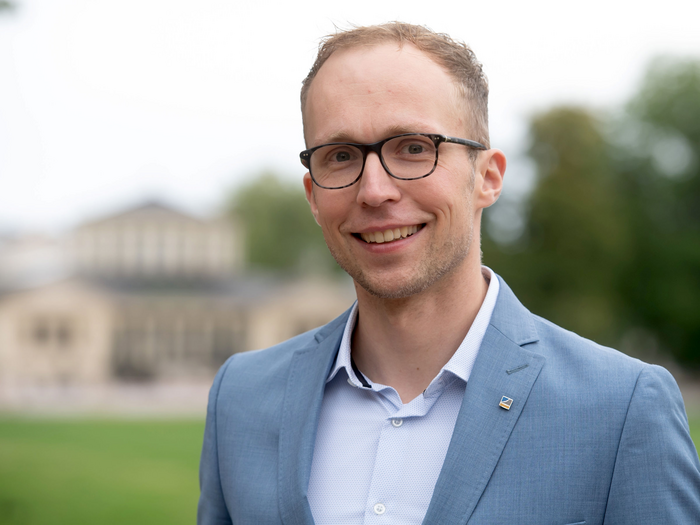Freshly appointed to the Faculty of Protestant Theology at the University of Bonn and immediately successful in acquiring one of the highest-ranking top grants of the European Union: Ethicist and Theologian Prof. Dr. Matthias Braun receives a coveted Starting Grant from the European Research Council (ERC). This is associated with funding of 1.5 million euros for the next five years. The researcher and his team are studying the ethical and societal impact of digital twins in healthcare.

Credit: Photo: Barbara Frommann/University of Bonn
Freshly appointed to the Faculty of Protestant Theology at the University of Bonn and immediately successful in acquiring one of the highest-ranking top grants of the European Union: Ethicist and Theologian Prof. Dr. Matthias Braun receives a coveted Starting Grant from the European Research Council (ERC). This is associated with funding of 1.5 million euros for the next five years. The researcher and his team are studying the ethical and societal impact of digital twins in healthcare.
Prof. Dr. Matthias Braun, who previously conducted research at the Friedrich-Alexander-Universität (FAU) Erlangen-Nürnberg, accepted an appointment to the chair of (Social-)Ethics at the Faculty of Protestant Theology at the University of Bonn in October of this year. No sooner had he arrived than he received an acceptance for a coveted Starting Grant from the European Research Council. He applied for funding during his time in Erlangen and will now continue and expand his research in Bonn. “I’m very honored to receive this recognition and I am deeply grateful for the trust that the ERC has placed in me,” says the researcher.
Braun wants to use the ERC Starting Grant to investigate the effects of digitalization in the healthcare sector on humans and society in more detail. “Emerging technologies include so-called digital twins,” says the ethicist. Such digital twins are simulations of certain bodily functions or organs that are created by using methods of artificial intelligence. These can provide real-time predictions of health risks and disease progression, as well as individualized feedback and alerts. Digital twins could also be used to test whether or which treatment methods are promising for a particular individual. Furthermore, surgeries could be practiced and tested.
Ethical questions about digital twins
The development of so-called precision medicine entails extraordinary responsibilities with regard to normative, societal, and political considerations, which have so far only been explored in rudimentary form. “In addition to the exciting new opportunities in this area of personalized precision medicine, we face fundamental challenges,” says Braun. So far, these challenges have mostly been considered seperately from each other, and there is no integrative theory that systematically addresses them.
The ERC project changes this and takes a look at four challenges: (1) How does our understanding of disease and health change when we are accompanied by a digital twin? (2) Who should own the respective digital body and who should have what kind of control over them? (3) How is one’s self-image affected when a person begins to interact with their digital body? (4) Do different digital twins also need different frameworks? Who has the right to access personalized predictions? Based on the experience of the vulnerability of human life, the SIMTWIN project aims to define a framework that respects human rights. The goal is to develop responsible concepts of consent and controllability regarding digital twins in health.
The way to the University of Bonn
Prof. Dr. Matthias Braun is a member of the Transdisciplinary Research Areas (TRAs) “Modelling”, “Life and Health” and “Individuals, Institutions and Societies” at the University of Bonn. After studying Biology and Protestant Theology, he initially worked as a researcher at the University of Marburg and conducted research as part of the “MaxSynBio” excellence project (jointly funded by the Max Planck Society and the German Federal Ministry of Education and Research).
Until September 2022, he headed the young researchers group “Ethics and Governance of New Technologies” at FAU Erlangen-Nürnberg. On October 1, 2022, he took over the chair of
(Social-)Ethics at the University of Bonn. Braun has been on research visits to Bergen (Norway), Maastricht (Netherlands), and Oxford (UK). He has published numerous articles in high-impact scientific journals, advises national and international boards and commissions, and contributes to civil society debates with his team.
Contact:
Prof. Dr. Matthias Braun
Chair of Social Ethics and Ethics of Technology
Faculty of Protestant Theology
University of Bonn
Phone +49 228 7360644
E-mail: [email protected]
URL: www.socialethics.uni-bonn.de




